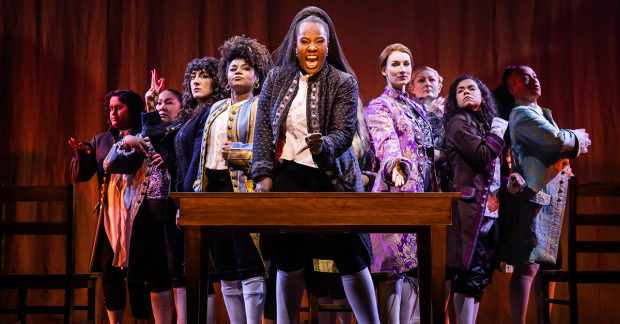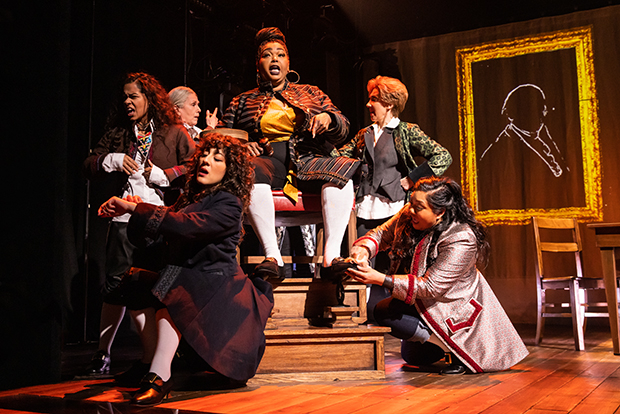Review: Broadway-Bound 1776 at American Repertory Theater Doesn't Feel So Revolutionary

(© Evan Zimmerman)
You were expecting, maybe, the second coming of Hamilton? Or even a runner-up to the more recent Suffs? Jeffrey L. Page's and Diane Paulus's Broadway-bound revival of the 1969 classic 1776 at American Repertory Theater is neither, though it deserves points for nontraditional casting. The evocative stage curtain, a patchwork of faded US flags (minimalist set by Scott Pask), parts to reveal a huge multiracial, multiethnic company – all cis-female, trans female, or nonbinary – dressed in ragtag rehearsal mufti. The actors shed their kicks, step into buckled shoes, roll up white hose, don frock coats – and the game is on. If only the rest of the production stayed as lively and arresting as this framing device.
"Hamilton" cleverly probed a lesser-known chapter of US history, "Suffs" the long-running feminist revolution, an uprising still in process, with the jury waxing punitive.
Surely the directors' "statement casting" is meant to further the latter cause. However, one salient problem with their perhaps over-earnest attempt to breathe new life into this seldom-revived work is that the audience is well aware, from the outset, just how the story will turn out, and the directors, whatever their revolutionary intent, are required to adhere to book writer Peter Stone's somewhat antiquated script and Sherman Edward's hit-or-miss songs. They haven't really figured out a way to amp up the suspense or make good use of the dissonant casting, except perhaps to suggest, obliquely, that had women actually been in charge back then, they probably would have gotten the job done with less fuss and fewer theatrics.
In retelling the events leading up to the signing of the Declaration of Independence, Stone and Edwards featured 20 or so delegates (out of the 56 actual signers), furnishing each with signature quirks. What little drama arises consists largely of interpersonal squabbles and the equivalent of oral position papers. The nitpicking and vote tallying soon grow tedious, as they surely did in real life, and the proceedings, larded with ostensibly helpful factual allusions, start to come across as school pageantry. The most captivating conflict is reserved for the end, when the pro- and anti-Independence factions thrash out whether to excise Thomas Jefferson's condemnation of slavery (we also know how that went: the scars persist to this day).
Throughout, Crystal Lucas-Perry does a yeoman's job as pro-Independence firebrand John Adams, basically the only character with a complex through line. After the opening group number, "Sit Down, John," Adams's colleagues continue to deride him as "obnoxious and disliked." That sentiment isn't echoed by the audience, though: Lucas-Perry has a voice as clarion and commanding as the Liberty Bell. Equally enjoyable are Adams's tender epistolary exchanges with his stuck-at-home spouse, Abigail. (Remember ""remember the ladies""? The co-directors have made a welcome addition to the original script – perhaps hoping to offset some of the sexism lurking within it). Lucas-Perry is beautifully partnered with Allyson Kaye Daniel, portraying a warm, smart, supportive, if "saucy" wife.

(© Evan Zimmerman)
It may be useful to keep in mind that this work was created at the onset of the sexual revolution. Much of the supposed humor comes across as puerile and even downright creepy. Case in point: A scene in which Adams and lechy Ben Franklin (Patrena Murray, inexplicably dull and marionette-like) wait around while Thomas Jefferson (Elizabeth A. Davis, steadfastly affectless) deflowers his young bride (Eryn LeCroy). Franklin's comment upon first beholding her – "And whose little girl are you?" – has aged particularly poorly. The pair are eager for Jefferson to get cracking on a first draft of the Declaration. Soon the freshly de-virginized Mrs. Jefferson emerges shrieking the orgasmic panegyric "He Plays the Violin" (cue demo with a suggestively flourished bow). Should you fail to get the gist, Mrs. J even enacts a swooning "petite mort" mid-aria.
Shawna Hamic has an all-too-brief stellar moment at the top of the show. She's a knockout as the ebullient Richard Henry Lee, whose self-aggrandizing anthem "The Lees of Old Virginia" brings down the house – but only fleeting-Lee (Lee is inordinately proud of his gift for wordplay) and very ear-Lee on. Several of the delegates pay questionable homage to the ladies by alluding to their lustiness. Mr. Lee starts that ball rolling by remarking on his eagerness to return home in order to – humping gesture – fulfill his manly duty and "freshen the missus." Were the men of the 18th century really so obliging, or so openly lewd in the workplace?
Toward the end, Salome B. Smith, playing a courier from George Washington's beleaguered Continental Army, stirringly delivers the lovely (but out of nowhere) ballad, "Momma, Look Sharp," a fallen soldier's lament. Sara Porkalob, playing a pro-slavery delegate from South Carolina, wrests the focus back to the matter at hand by packing ample bite into "Molasses to Rum," which alludes to the North's full participation in the pernicious Triangle Trade. This group number is hauntingly staged by the otherwise light-handed co-director and choreographer Jeffrey L. Page.
There are several thrilling moments packed into this two-and-a-half—hour hodgepodge, and plenty of pleasure to be had in individual performances. Even so, what struck the musical-makers of a half-century ago as revolutionary has lost much of its incendiary kick.











